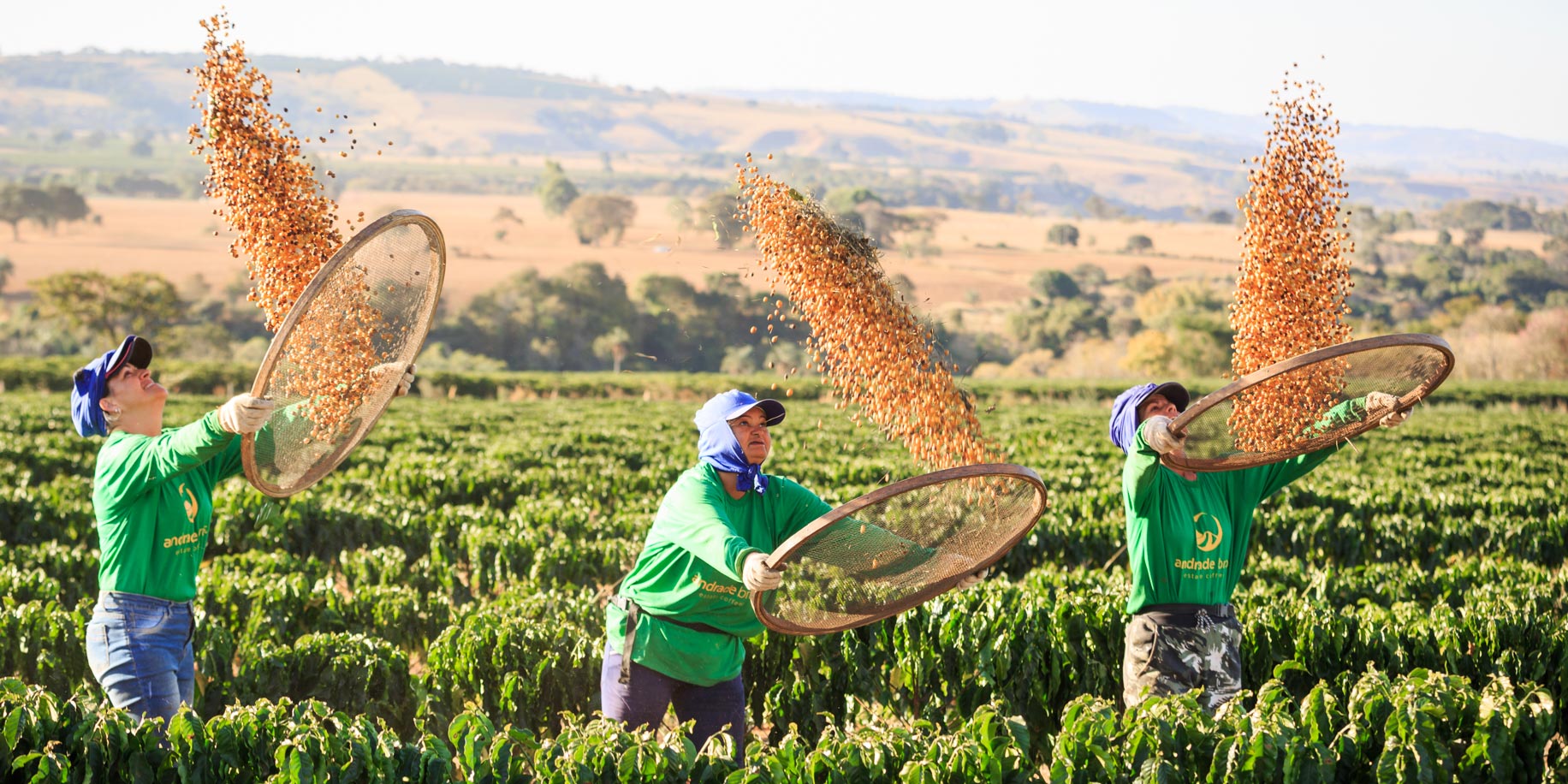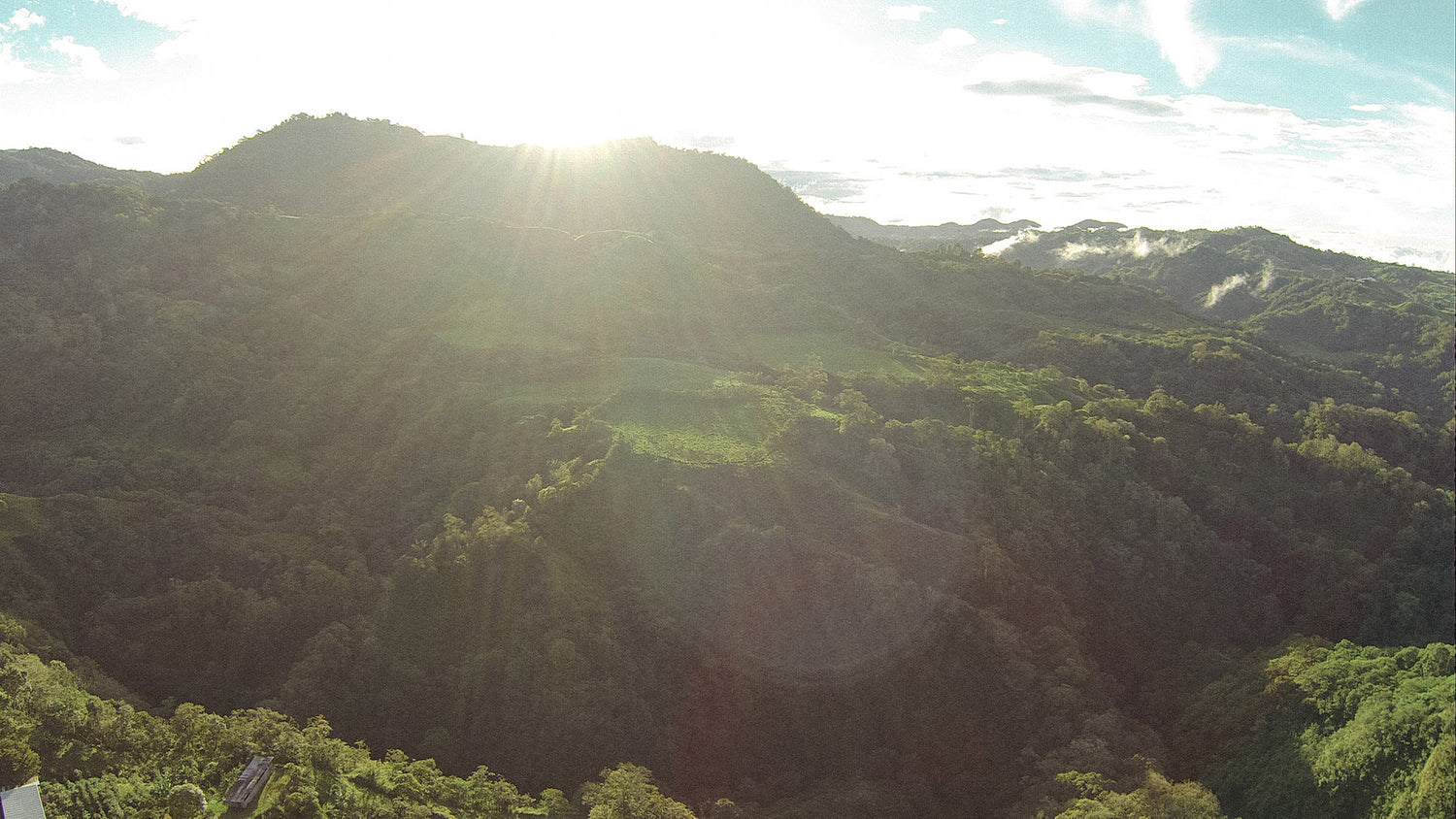Carnival in Rio, Copacabana, football & coffee! That's right! Here it's all about coffee cultivation in Brazil. Brazilian coffee is known and popular for its mild, chocolatey taste paired with nutty accents . The coffee is cultivated at around 1,150m , which is why the caffeine content of coffee from Brazil is higher than that of, for example, highland coffee. Caffeine serves as a natural protective agent against pests for the coffee plant. At lower altitudes, such as in Brazil, the risk of infestation is increased. As a result, the coffee plant produces more caffeine to optimally protect itself from these external influences. In addition, Brazil normally offers perfect climatic conditions for growing coffee . However, local farmers have had to accept considerable crop losses in the last two years due to climatic extremes.

Exciting facts about coffee from Brazil
Brazil & coffee – a combination that simply fits! In the last few decades, Brazil has become the world's leading coffee producer. Of the approximately 15 billion coffee plants worldwide, around 4 billion coffee plants are in Brazil alone. This means that Brazilian coffee accounts for around 34% of the total demand on the world coffee market .
Coffee has been cultivated and processed in Brazil since the 18th century . Over the years and with the advent of industrialization, the previously wild fincas developed into large plantations designed for the cultivation of larger quantities . However, this development also had its downsides, as the great success could only be achieved through slavery . This was actually only banned and abolished in 1888 .
Coffee from Brazil - Coffee production today
Coffee production in Brazil is generally concentrated in four states: Sao Paulo, Paraná, Espirito Santo & Minas Gerais . The Paraná region has almost a monopoly, as almost half of all coffee cultivation in Brazil is located there. Around 80% of the beans grown are Arabica beans. But Robusta beans are also grown in Brazil.
The harvest is carried out both by hand and by machine. Another characteristic of Brazilian coffee is the processing, which is usually done naturally . However, semi-washed processing methods are also becoming increasingly popular. This allows the fine notes of the pulp to be absorbed directly into the bean. This also creates delicate, sweet flavors that are paired with chocolate accents.

The taste of coffee from Brazil
Coffee from Brazil is particularly varied in terms of taste. The growing region, among other things, influences the aroma. Coffee varieties with a milder taste can be found on the Brazilian coast. Brazilian coffees, on the other hand, are somewhat stronger and are cultivated in the hilly southeast of Brazil. Typically, coffees from Brazil contain relatively little acid compared to other growing regions, which is why they are considered particularly digestible and, depending on the roast, are also suitable for more sensitive coffee drinkers. Typically, Brazilian coffees are particularly known for their fine, chocolatey taste . This is usually paired with nutty nuances. Thanks to a wide variety of new processing trends, Brazilian specialty coffees have also really made a breakthrough. Targeted fermentation has made it possible to highlight the fruity accents of Brazilian coffees . The end result: cup profiles with fine notes of yellow fruit and honey with fine floral accents.

A new industry - specialty coffee from Brazil
The targeted emphasis on the unique taste of smaller harvests, so-called microlots. This development also led to the formation of the Brazil Specialty Coffee Association in 1991. At that time, there were 12 farmers who formed an alliance for the targeted marketing of particularly high-quality coffees. It was precisely at this time that demand increased not only for large quantities of coffee, but also for coffees of particularly high quality. The BSCA introduced its own seal, which was issued according to certain taste criteria. This system, which is based on sensory factors, still exists today. Criteria include sweetness and balanced body. Any coffee that scores over 80 points can ultimately call itself a specialty coffee .

The Cup of Excellence
Since 1999, the Coffees of Brazil Quality Contest – Cup of Excellence has been organized jointly with the Alliance of Coffee Excellence (ACE) and the Brazil Specialty Coffee Association. This award is also presented in 11 other countries of origin .
The Cup of Excellence offers farmers the chance to present the extraordinarily high quality of Brazilian coffee to the whole world. The Cup of Excellence can also be auctioned directly through the two organizations. The prices for these coffees are naturally very high. Why? The Cup of Excellence rewards the best harvest in the country. We have also been able to get our hands on one or two Cups of Excellence and share them with our customers.

Coffee from Brazil in the Wild Coffee Roastery
Of course, we also offer the best coffee from Brazil, which we process carefully and sustainably in our coffee roastery. The coffee comes from the Finca Capim Branco owned by farmer Ismael José de Andrade . Together with his brother, Ismael runs a total of 3 fincas: Finca Capim Branco, São Silvestre & Dolce Cerrado . Ismael is a certified farmer of the Brazil Specialty Coffee Association and wants to further promote the cultivation and distribution of Brazilian specialty coffees. He has even won the Cup of Excellence several times .

Coffee from Brazil - Brasil Capim Branco
Our classic from Brazil is the Brasil Capim Branco. The green coffee comes from the Yellow Catuai variety , which is typically grown in Brazil. After harvesting, the cherries are processed naturally into green coffee. This means that the cherries are dried in the sun for a longer period of time. The light sweetness and notes of honey are thus also absorbed by the green coffee bean.
This creates a full-bodied, creamy cup profile , which is rounded off with excellent notes of milk chocolate and honey. The Brasil Capim Branco is therefore suitable for all preparation methods. The coffee is a real all-rounder, especially in fully automatic machines, both pure as an Americano or as a cappuccino.
Coffee from Brazil - Microlots from the Andrade Bros
The two Andrade brothers also produce smaller harvests each year that impress with much more unusual notes. These small harvests mostly come from the Finca São Silvestre and are better known as microlots . Experimental processing methods such as aerobic processing or carbonic maceration are also used there in order to be able to offer an even wider sensory spectrum. You can regularly find these high-quality coffees in the specialty coffees in our online shop .


